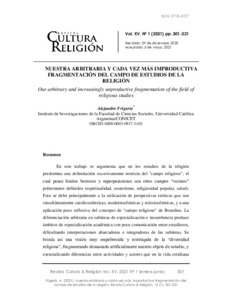Please use this identifier to cite or link to this item:
https://repositorio.uca.edu.ar/handle/123456789/12547| Título: | Nuestra arbitraria y cada vez más improductiva fragmentación del campo de estudios de la religión Our arbitrary and increasingly unproductive fragmentation of the field of religious studies |
Autor: | Frigerio, Alejandro | Palabras clave: | RELIGION; RELIGIOSIDAD POPULAR; ESPIRITUALIDAD; DIVERSIDAD RELIGIOSA | Fecha de publicación: | 2021 | Editorial: | Universidad Arturo Prat | Cita: | Frigerio, A. Nuestra arbitraria y cada vez más improductiva fragmentación del campo de estudios de la religión [en línea]. Cultura & Religión. 2021, 15(1) Disponible en: https://repositorio.uca.edu.ar/handle/123456789/12547 | Resumen: | Resumen: En este trabajo se argumenta que en los estudios de la religión
predomina una delimitación excesivamente restricta del "campo religioso", el
cual posee límites borrosos y superposiciones con otros campos “vecinos”
pobremente definidos (espiritualidad, esoterismo, religiosidad popular, salud).
Esto se debe principalmente a la utilización de perspectivas teóricas que son
simultáneamente catolicocéntricas, modernocéntricas y eclesiocéntricas, y a una
aplicación poco reflexiva del concepto de "campo religioso" de Bourdieu. La
diferenciación arbitraria en subáreas de especialización e incumbencia produce
ámbitos de especialización académica con poca comunicación entre estudiosos,
dificultando interpretaciones abarcadoras e integradoras de las subáreas. Se
brinda así una visión muy empobrecida y restringida de la “diversidad
religiosa”, fragmentando demasiado artificialmente nuestro objeto de estudio, y
esencializando diferencias entre actividades y actores que en la vida cotidiana de los sujetos están muy entrelazados. Se proveen dos ejemplos empíricos que
muestran cómo esta subdivisión invisibiliza la diversidad religiosa en el pasado
argentino y dificulta su comprensión. Abstract: In this article, the authors argue that an excessively restrictive limitation of the “religious field” dominates religious study that has blurred borders and overlaps other “neighboring” fields that are poorly defined (spirituality, esoterism, popular religiosity, health). This is mainly due to the use of theoretical perspectives that are simultaneously focused on Catholicism, modernity and Ecclesiastic beliefs and the application of Bourdieu’s concept of “religious field” that involves little reflection. The arbitrary differentiation of specialization and purview into sub-areas produces areas of academic specialization that have little communication between scholars. This stands as an obstacle to expansive and integrative interpretations of the sub-areas. As such, a very impoverished and restricted vision of “religious diversity” is offered, fragmenting our subject of study in an excessively artificial way and essentializing differences between activities and actors that are very much intertwined in daily life. Two empirical examples are provided that show how this subdivision makes invisible the religious diversity of Argentina’s past and stands in the way of its understanding. |
URI: | https://repositorio.uca.edu.ar/handle/123456789/12547 | ISSN: | 0718-4727 | Disciplina: | CIENCIAS SOCIALES | Derechos: | Acceso abierto | Fuente: | Cultura & Religión. 2021, 15(1) |
| Appears in Collections: | Artículos |
Files in This Item:
| File | Description | Size | Format | |
|---|---|---|---|---|
| nuestra-arbitraria-cada.pdf | 447,39 kB | Adobe PDF |  View/Open |
Page view(s)
82
checked on Apr 27, 2024
Download(s)
126
checked on Apr 27, 2024
Google ScholarTM
Check
This item is licensed under a Creative Commons License

